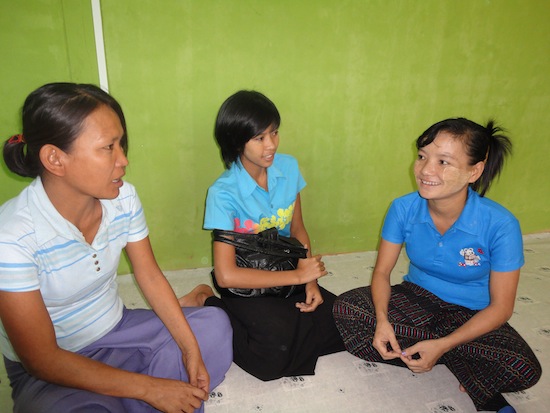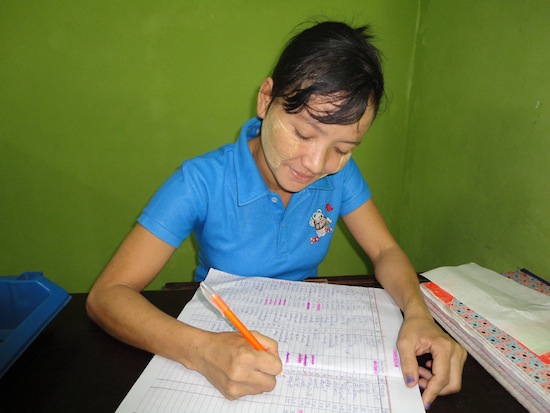
Last month, AFP's Alex Delamare wrote an article about a sex worker clinic in Myanmar where sex workers were offered "solace from stigma." Behind Delamare's piece are stories of incredible women, who have overcome enormous odds in an effort to help fellow sex workers in their country.
One of those women is Thandar Oo, who is 33. Thandar was lucky growing up. Though her father died when she was just a girl, her mother was committed to Thandar's education and did everything she could to make sure her daughter would attend university. In Thandar's first year, she married and she and her new husband had two children together. But eventually Thandar's husband lost his job and -- unable to provide for his family -- he left Thandar and his two kids so he could start life anew elsewhere.
It was around that same time that Thandar found out her mother was sick. So Thandar and her children moved back in with her mother, to take care of her. Neither Thandar nor her mother had a job, and there was no income coming in to feed and support the family. So Thandar did the only thing she could do, she brought in income by selling herself for sex.
After a few years of sex work, Thandar met a woman who told her she should get tested for HIV. She knew of a nearby drop-in center where she could be tested. The drop-in center was created as part of PSI (Population Services International) Myanmar's TOP Project, which is funded by the generous support of USAID.
TOP's goal is to provide support to those most at risk of HIV in the country, specifically female sex workers and men who have sex with men. Through the project PSI created 18 TOP Drop-in Centers throughout the country. TOP is run by Habib Rahman a PSI Myanmar staff member and sociologist who has been working with these high-risk groups for more than 20 years.
In 2005, Thandar visited one of the TOP drop-in centers and got tested. The test came back positive. Thandar was devastated and thought her life was over. Eventually, through counseling and follow-up care provided by TOP, she came to realize that she had good years left. It was then that she decided to rededicate her life to helping other women like her.

She asked to become a TOP peer educator. As a peer educator she learned about HIV, STIs and other issues around women's health. Then she set out on foot to visit brothels, karaoke bars and talk with girls on the street, teaching them how they could protect themselves from the disease and giving them tips on how they might eventually get off the streets.
She did this for years, eventually working her way off the streets and becoming a full-time peer educator at the TOP center. Over time, HIV started taking its toll and she became too weak to walk the streets as an outreach worker. But that didn't stop her. She learned basic computer skills from TOP and became the Director in Charge of the entire Center. More impressively, she also founded a group called The Saturday Club. The Club is for HIV-positive sex workers only. She started at her own Center, inviting the women to the center every Saturday to talk about everything and anything -- from anti-retroviral treatments to how it felt to be HIV positive and working the streets. That single club has since grown into a network of more than 500 women across the country -- all of them HIV positive women in need of support.
Thandar has entirely changed the landscape for HIV-positive sex workers in Myanmar and has said numerous times that she will continue to help these women until the day she dies.
In terms of the impact of Thandar's work and the work of the TOP project as a whole:
Last year alone, more than 57,000 female sex workers benefited from TOP. At the centers, women can access individual counseling, bathing facilities, group sessions on sexual health, English classes, life skills education, diagnosis and treatment of STIs, and voluntary counseling and testing for HIV. More importantly, they're given a safe space away from the stigma and discrimination they often face in the streets.
